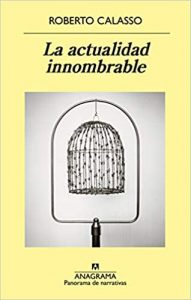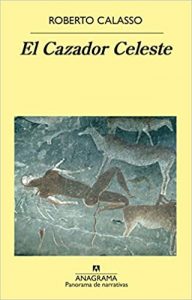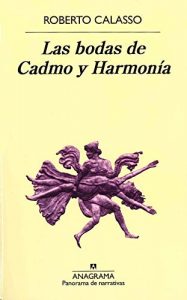Literary invoice from creation to edition, Roberto Calaso He is another of the most illustrious Italian storytellers, along with Erri de Luca. With its always avant-garde spirit, Calasso regularly visits the most spiritual nonconformity, resignation and disenchantment from a world for him increasingly turning his back on the essence of every vestige of humanism.
Despite his constant plotting, in his works Calasso offers a changing, mutable scenography. Thus composing a bibliographic mosaic towards the most complete imaginary. In a juicy essay in a novel disguise, sometimes we start from very different characters or approaches and fates or distant destinations. Only that the movements, the wills, the conditions are analyzed from that viewing of a great tragic work of antiquity.
After a more purely essayistic beginnings around an ancient world (in which Calasso enjoys stripping the very gods of Olympus in the transcendent), little by little the author focused more on the drift of everything in this world full of chance or predestination, depending on who looks at it.
Top 3 best works of Roberto Calasso
The unnameable present
Today's world has reached the definitive stage of secular society, one that only trusts society itself. Homo saecularis accepts rules but not precepts, procedures but not convictions. He feels humanist and practices a religion without divinity, based on altruism, without relation to the invisible. Why, then, does a form of terrorism emerge that consists of random killings, in which the victims can be any as long as they are as numerous as possible? Perhaps because, in a world like today, only murder offers a guarantee of meaning. The enemy of the Islamic terrorist, thus, is the body of the entire secular society.
The unmentionable actuality is divided into two well-differentiated parts: in the first, Calasso makes a brief history of the origin of Islamic terrorism, and also makes an incisive, stark definition of our current world, the «age of inconsistency», or, in In Calasso's own terms, the era of the «experimental society», whose tutelary figures were Bouvard and Pécuchet, those distinguished fools invented by Flaubert, well-intentioned consumers of magazines and pamphlets who consider themselves perfectly informed about everything: «It is to them that one can trace , in its germ, what one day was going to be called the internet.”
And, with the digital mesh that envelops the world, the consolidation of hatred of intermediation, in a virtual dream of direct democracy that endangers the essentially procedural nature of the parliamentary system. The second part is a collection of quotes – from writers such as Virginia Woolf, Ernst Jünger and Céline or thinkers such as Simone Weil and Walter Benjamin, but also from Nazi leaders such as Goebbels – that cover the period from 1933 to 1945: the years in that the world carried out a partially successful attempt at self-annihilation.
En The unnameable present, Calasso extends the reflections that guide his latest books, in particular his concern about the dangers that threaten secular society, which celebrates itself without seeing the abyss that opens at its feet. But, for the first time, in this short volume Calasso places the focus on today's world, which he calls "unnameable" - showing that our vain reliance on science and technology does not help us to know something consistent and definitive about our present - and which, nevertheless, it portrays in a clear, effective, clairvoyant way. It took a trajectory of many years, books and knowledge to arrive at such a brief and forceful definition of the moment in which we live and that we can hardly look without partial blindness.
The Celestial Hunter
One day that actually spanned thousands of years, Homo did something that no one had ever tried: he began to imitate other animals, his predators. That was how he became a hunter. That very long day is, today, remote, but his traces persist, although no one seems interested in investigating them anymore. Rites and myths mixed traces of that behavior with something that Ancient Greece called to tehion: the divine, closely related to the sacred and holiness. Many cultures, distant in space and time, associated these dramatic and erotic events with a certain region of the sky, between Sirius and Orion: the place of the Celestial Hunter. Their stories weave the fabric of this book, and radiate in multiple directions: from the Paleolithic to the Turing machine, through ancient Greece and Egypt, and exploring the many latent connections within a territory that is both unique and unlimited. , the mind.
From Burning, where Calasso investigated the plot of the sacrificial rites practiced by all cultures and religions (and whose –apparent– disappearance in the modern era does not stop having tragic resonances, as he also demonstrated in The unnameable actuality), This book returns to the complex and fascinating configuration of that (huge) part of our world that rationalism and scientism leave aside.
Why does Zeus allow his brother Hades to kidnap his daughter Persephone, much to the despair of his mother, Demeter? What, by the way, was "Zeus's last night on Earth"? What surprised Herodotus most about the Egyptian magicians during his journey up the Nile? Why did the poet Ovid, who compiled that monumental encyclopedia of classical mythology that are The metamorphoses, Did you worry about writing about something as seemingly futile as cosmetics or the art of seduction? What is supported by the theory that, rather than predatory big cats, Homo imitated hyenas?
The reader will go through these pages as if in a trance: a journey through the forms of communication between the human and the "invisible"; forms that live in a continuous present. Because this narrative is the novel of things that seem very distant and that, nevertheless, are among us, as soon as we allow Calasso to indicate us where to look.
The wedding of Cadmus and Harmony
How Zeus, in the form of a white bull, kidnapped Princess Europa; Theseus abandoned Ariadne; Dionisio raped Aura; Apollo was a servant of Admetus, out of love; Helena's simulacrum appeared, along with Achilles', on the island of Leuké; Penelope conquered Hipodamía; Coronis, pregnant by Apollo, betrayed him with a mortal; the Danaides cut off the heads of their husbands; Achilles killed Penthesilea and joined her; Orestes struggled with madness; Demeter wandered in search of her daughter Core; Core looked at Hades and saw herself reflected in his eyes; Phaedra went mad for Hippolytus; Fanse allowed himself to be devoured by Zeus; the Cercopes laughed at the buttocks of Heracles; the huntress Cyrene joined Apollo in wolf form; Zeus decided to exterminate the heroes; Ulysses lived with Calypso; the Olympians came down to Thebes to participate in the wedding of Cadmus and Harmony ...
The weddings of Cadmus and Harmony were the last time the Olympian gods sat at the table with men for a feast. What happened before then, for years immemorial, and after then, for a few generations, forms the immense tree of Greek myth.




I stopped reading Calasso a long time ago. As the saying goes, "whoever doesn't know you, let him buy you." However, I did manage to read "The Marriage of Cadmus and Harmony." In this book, women are often seen as active victims, and their rapes are portrayed as poetic and charming. Excellent. You can tell Calasso the rape thing seems like a great plan. Anyway, the fact is that I still remember this conspicuous element licking its lips literally when talking about human sacrifices. Nor do I forget his hidden fondness for the satanic, which he uses to sow evil insinuations, his unscrupulousness, his malevolence and above all his disgusting arrogance when relating to me in spite of me. Even his editor calls him "the perfidious Calasso"! In the last book he sent me, the dedication read like this: »For Blanca. Even if you don't want to, it's for you. Attention: EVEN IF YOU DON'T WANT. That is Calasso in its purest form, a miserable creature that, with luck, if the Me Too reaches Italy, we will be able to see it degraded in its old age and, if there is no luck and it leaves this world, we will be able to see undoubtedly discarded. in the Valley of Jehoshaphat as everything that is worthless, everything where there is no atom of goodness, everything that is merciless and enemy of the human.